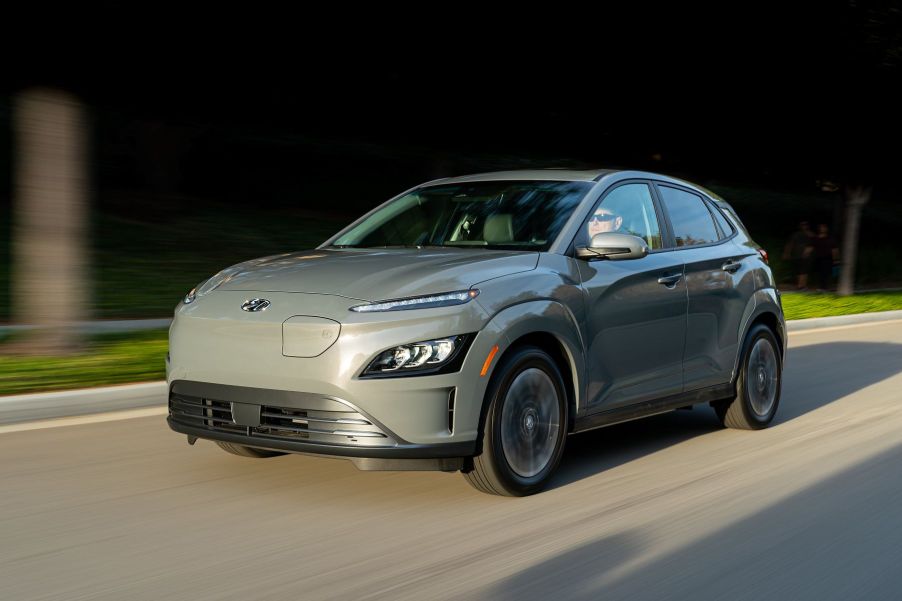
Hyundai Reveals Its Eco-Friendly Vehicle Sales Jumped by 245%
The semiconductor chip shortage has affected every automaker to some degree, but Hyundai seems to be better off than others. For example, recently released the Santa Cruz pickup, which has been moving units quickly across the country. However, more people are interested in the automaker’s variety of eco-friendly vehicles.
In a new press release, Hyundai said that it had seen record-breaking sales for most of the year. Its total sales are up by 8% this month, and its market share has also increased. How well have Hyundai’s greener options been faring in this hectic market?
Eco-friendly Hyundai sales enjoyed a massive increase

Hybrids and EVs took the lion’s share of Hyundai’s earnings for August 2021, with a 244% boost in sales. According to Hyundai, “New retail August sales records were established for Ioniq EV, Ioniq PHEV, Kona EV and Nexo.” The Nexo had the biggest overall increase, selling almost double the number of units this August compared to last year.
The Hyundai Ioniq was the best performer in terms of volume, selling 1,060 units this month. The Kona’s sales were up significantly as well, both for the Kona Electric model and the gas-operated versions. Hyundai also noted its announcement of the Ioniq 5 Robotaxi, one of the first self-driving public transit vehicles.
What are the company’s most popular hybrids and EVs?
The Hyundai Nexo is probably the name you’re least familiar with, seeing as it’s currently only sold in California. While there are a few hydrogen fuel-cell sedans, the Nexo is the only SUV with this powertrain. Its battery and fuel-cell stack produce a total output of 161 horsepower and 291 lb-ft of torque.
It’s sufficient for the Nexo’s weight, but don’t expect any fun joyriding potential. Fuel economy is where the Nexo really shines, with the Blue trim earning 380 miles of range. There’s also plenty of passenger space inside the Nexo’s modern interior and almost as much cargo space as a gas-powered Tucson.
The Hyundai Ioniq is available in four flavors of powertrain, but the PHEV model proves to be one of the most popular. It only produces 139 horsepower, but 29 miles of electric driving range is plenty for the average city commute. Even when feeding off the gasoline reserve, it’s still highly efficient at a 52 mpg combined city/highway rating.
The Ioniq also has a fully electric model, though it’s currently only available in 13 states. The Hyundai Ioniq Electric only has 170 miles of range, putting it far behind several rivals. It’s also not the most powerful sedan, but its energetic styling might fool you otherwise.
The Hyundai Kona Electric is much more road trip-worthy, earning 258 miles on a single charge. According to Car and Driver, the Kona Electric’s 201-horsepower motor allows it to reach 60 mph in only 6.4 seconds. In addition to its swiftness, testers also praised this EV for its agile handling and comfortable ride. No seating or cargo capacity is lost due to the battery pack, though the Kona never offered an overabundance of either.
Hyundai’s growth compared to last year
In addition to a successful August, many Hyundai vehicles will likely have a record-breaking year. The subcompact Venue has sold 19,481 units so far, an 87% increase from 2020. The Hyundai Sonata, also available as a hybrid, enjoyed a 62% yearly boost in sales with 73,134 units sold.
Of course, you could argue that more people are driving again, hence the increased demand for cars. However, few automakers have had such groundbreaking success this year as Hyundai. Additionally, while the automaker had to make some production cuts, it could resume normal operations faster than other rivals. Powered by increased consumer demand for EVs, Hyundai’s not slowing down.


